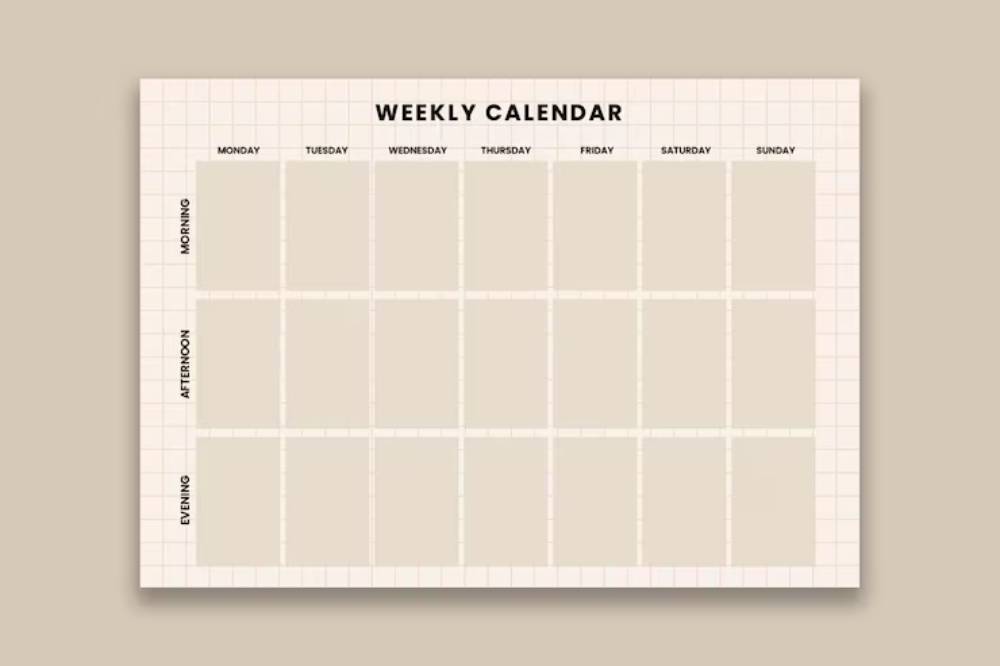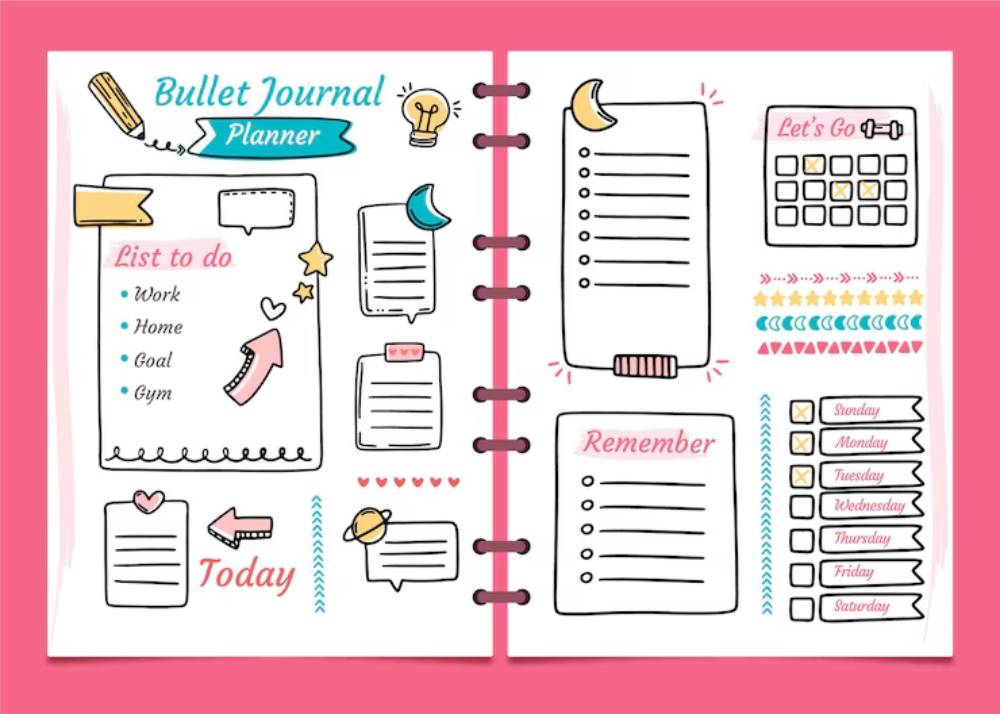
Weekly Planning Templates That Keep You on Track
In the whirlwind of student life, time can feel like it’s constantly slipping through your fingers. With lectures, assignments, revision sessions, social plans and maybe even a part-time job — how do you stay on top of it all without burning out? That’s where a weekly study planner comes in.
A good planner isn’t just a to-do list; it’s a tool that helps you manage your energy, maintain consistency, and build habits that drive long-term academic success. This article will guide you through the benefits of weekly planning, introduce you to effective student templates, and show you how to personalise your weekly study plan to match your learning style.
Let’s dive into how structured weekly planning can take the chaos out of your study life and put you back in control.
Why Weekly Planning Works for Students
Creates Structure and Reduces Overwhelm
One of the biggest challenges students face is juggling multiple responsibilities without a clear system. Weekly planning helps you:
- Break big goals into smaller, manageable tasks
- Spread workloads evenly to avoid last-minute cramming
- Make space for rest and social activities
By mapping out your week in advance, you’ll reduce stress and know exactly what you need to focus on each day. Instead of reacting to deadlines, you’re proactively managing them.
Example: Imagine you’ve got three assignments due in the next two weeks. Instead of panicking a few days before each deadline, your weekly planner can help you break each task down into research, drafting, and editing phases — spread neatly over the coming days.
Encourages Consistency and Habit Building
Repetition builds habits, and weekly planning helps you create a rhythm. For instance:
- Set fixed days for lectures and tutorials
- Allocate specific time slots for revision
- Build in regular breaks and review points
With a consistent plan, your brain starts associating certain times of day with certain tasks — like Pavlov’s dog, but with textbooks instead of treats.
Visualises Time Spent on Tasks
Many students fall into the trap of underestimating how long things take. When you plan out your week, you’ll start to:
- See where your time goes
- Identify patterns (like procrastination)
- Make more realistic plans for the future
Key Elements of an Effective Weekly Study Planner
A useful weekly study planner should include more than just blank boxes. Look for or create templates that feature:
1. Time Blocks
Break each day into hourly or half-hourly blocks. This allows you to:
- Allocate specific times for tasks
- Prevent overbooking yourself
- Spot any “dead zones” where you can sneak in extra study
2. Priority Levels
Not all tasks are equal. Use symbols or colour-coding to highlight:
- Urgent deadlines
- High-priority readings
- Revision topics for upcoming tests
3. Subject or Course Sections
If you’re juggling multiple classes, it helps to divide tasks by subject. This ensures you’re:
- Not neglecting any one course
- Tracking how much time is being spent on each topic
4. Notes and Reflection Space
Keep a small section at the bottom of each day or week for:
- Reflection (“What went well this week?”)
- Adjustments for next week
- Personal notes or motivational quotes
Pro tip: Some students like to include a “wins” section where they can list small victories — from finishing a reading to staying off social media during study blocks. It’s a great way to build positive reinforcement.
Popular Weekly Planning Templates to Try
There’s no one-size-fits-all solution, but here are some tried-and-tested templates students love:
1. The Classic Grid Planner

Best for: Visual learners who like a simple overview
This layout shows the entire week on one page, with days across the top and time blocks down the side. You can:
- Colour-code by subject
- Easily scan for busy days or open gaps
- Add sticky notes for tasks that move around
2. The Time-Blocking Digital Calendar
Best for: Tech-savvy students or remote learners
Using tools like Google Calendar or Notion, you can:
- Drag and drop tasks around your day
- Set reminders for sessions
- Sync across devices
Bonus: You can layer in personal events, exercise, and breaks so everything is in one place.
3. The Pomodoro Weekly Tracker
Best for: Students who struggle with focus
Use this layout to track study sessions using the Pomodoro Technique (25 minutes of focused work, 5-minute break). Plan your week by:
- Assigning pomodoros per task
- Marking completed sessions with ticks
- Reviewing how many you completed each day
4. The Task-Focused Weekly List
Best for: Students who hate time tracking
Instead of scheduling everything by the hour, this planner lists tasks under each day. You:
- Tick off tasks as you go
- Feel less rigid and more flexible
- Can group by priority or subject
How to Customise Your Weekly Study Plan
Consider Your Energy Levels
We all have different productivity peaks. Plan around your personal rhythm:
- Morning person? Schedule deep work before lunch.
- Night owl? Save heavy tasks for later in the evening.
Plan Around Real-Life Commitments
Whether you work part-time, have family responsibilities or attend sports practice, your weekly planner needs to reflect your real life.
Tip: Always plan for buffer time. Life happens — buses are late, laptops crash. A little breathing room prevents your whole schedule from collapsing.
Use Tools That Suit Your Personality

- Like paper? Go with a printable or bullet-journal style planner.
- Prefer digital? Use calendar apps, Notion, or Trello.
- Hybrid lover? Start on paper and transfer the big items to a digital version.
Stay Flexible
A weekly plan isn’t set in stone. Review your planner every Sunday night or Monday morning:
- Did you stick to your goals?
- What threw you off track?
- What can be improved for next week?
This reflection keeps your planner useful and dynamic, not a dusty page you abandon by Wednesday.
Making Weekly Planning a Habit
It’s one thing to use a planner once, and another to make it a regular practice. Here’s how to build it into your routine:
1. Set a Weekly Planning Ritual
Choose a set time each week to plan — maybe Sunday afternoon or Monday morning. Make it enjoyable:
- Brew a cup of tea
- Put on relaxing music
- Review the week before, celebrate wins
2. Use Visual Cues
Stick your planner on your wall, keep it on your desk, or set it as your phone background. The more you see it, the more likely you are to follow it.
3. Involve a Study Buddy

Planning with a friend adds accountability. You can:
- Review each other’s weekly plans
- Schedule joint study blocks
- Cheer each other on
4. Reward Yourself
Finished everything on your weekly plan? Reward yourself! A movie night, a sweet treat, or a tech-free afternoon — whatever feels like a win.
Weekly Planning in Action: A Real-World Example
Let’s say you’re a second-year psychology student with the following commitments:
- 3 lectures
- 2 tutorials
- 1 part-time retail shift (Saturday)
- Reading lists
- A 1,500-word essay due in 10 days
Here’s how a smart weekly planner can break this down:
Monday:
- 10:00 – 11:00: Psychology Lecture
- 11:30 – 12:30: Review notes and summarise key points
- 14:00 – 15:00: Library session for essay research
Tuesday:
- 09:00 – 10:00: Sociology Lecture
- 11:00 – 12:00: Group study session
- 13:00 – 14:00: Essay outline
… and so on.
You’d spread your essay work across the week — research, planning, writing, editing — while still making time for tutorials and social life. Come Saturday, your retail shift doesn’t feel like a derailment, just another part of a well-managed week.
With a personalised weekly study plan, you can:
- Reduce academic stress
- Stay on top of deadlines
- Build strong study habits
- Free up time for what matters to you
Plan Weekly, Win Daily
Weekly planning isn’t just for the super-organised or stationery enthusiasts. It’s a powerful tool that puts you back in control of your time, your energy, and your goals.
The key is finding a system that works for your life and committing to small, consistent steps. Try out a few templates, customise what you need, and give it a few weeks to really feel the difference.
What kind of planner do you use? Have a study routine that keeps you on track? Share your tips or questions in the comments below — we’d love to hear from you!


